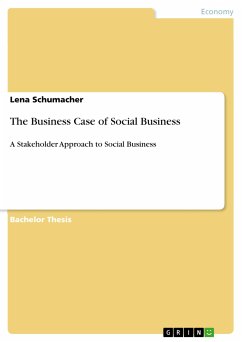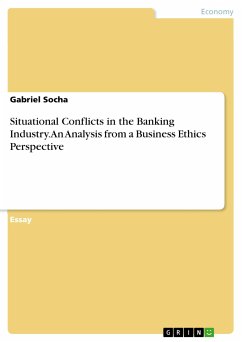Bachelor Thesis from the year 2010 in the subject Business economics - Business Ethics, Corporate Ethics, grade: 1,5, EBS European Business School gGmbH, language: English, abstract: During recent years, much has been written about Corporate Social Responsibility (CSR), sustainability, sustainable and ethical supply chains, and the power of organizations that reaches beyond their core business activities. Social Business, a rather new form of using corporate power in order to act in a socially desirable manner, was first established by Professor Yunus, Noble Peace Prize winner (2006). It is in contrast to charity because it is not a donation or charitable giving but a real investment into a business. The important difference is that with a social business the entrepreneur or the participants in a social venture business do not intend to maximize profits but will always reinvest profits into the business and will keep costs and prices low so a broad range of non-affluent consumers can afford the product or service (Yunus, Bertrand, & Lehmann-Ortega, 2009, p. 5). Yunus (2006) calls this "doing business for others instead of for oneself" (p. 4). Since Social Business is a very new concept, little has been written about it yet. There is not even a generally accepted and shared definition of the term "Social Business". Millions of small social start-ups, whose founders intend to do something socially beneficial and who only take out from the business the money they need for their own upkeep, already exist. However, to differentiate between charity projects and real social businesses is difficult. For this reason, it is impossible to collect empirical data about these start-ups and projects. Much more in the focus of the public eye are social businesses founded by multinational companies (MNCs) or at least renowned national companies. This often includes a product relating to the key competence of the firm which is adapted to the needs of less-well-off consumers and thereby solves a shared social problem. MNCs often use the know-how and competence of non-governmental organisations (NGOs) or similar institutions and start social joint-ventures. Since it is much easier to collect data about this kind of social business and since their influence and recognition in industrialized countries at the moment is much bigger than of the numerous small start-ups, this paper is going to focus on social businesses initiated by big companies.[...]
Dieser Download kann aus rechtlichen Gründen nur mit Rechnungsadresse in A, B, BG, CY, CZ, D, DK, EW, E, FIN, F, GR, HR, H, IRL, I, LT, L, LR, M, NL, PL, P, R, S, SLO, SK ausgeliefert werden.









